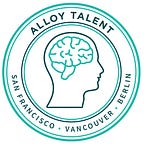Managers Club Interview with Evan Goldenberg, CTO at Alloy
This series asks engineering managers to share their experiences with the intent of helping other engineering managers learn and improve.
What’s your background and how did you get into management?
I have a background in Mechatronics Engineering, but I’ve always been drawn to the software side of things. When I graduated from University of Waterloo, I expected to stay in Canada and work on software in the robotics space. Instead, I ended up at Addepar and spent 3 years in Silicon Valley. My first manager (who later co-founded Alloy with me) encouraged me to take on big projects and gave me a lot of responsibility. I became a team lead after about a year, and ran Addepar’s intern program a couple of times as well. I’m an engineer at heart and have always remained very hands-on.
What are the biggest challenges you face?
There is so much happening at a growing software company like Alloy. We are continually hiring, creating innovative products, scaling our infrastructure, and working to delight our customers. Many of us at Alloy have big ideas and a strong vision for what things should look like. Choosing what to work on — and more importantly, what not to work on — is a real challenge, especially in the face of constraints and uncertainty. One of Alloy’s values is “iteration is the path to perfection.” I think about that every day, and encourage my team to do the same. It makes daunting tasks seem easier, and lowers the perceived risk of a wrong turn.
Another challenge I face sometimes is remembering to look out for my own needs. It’s easy to neglect myself when I feel a sense of responsibility to others, but ultimately I am able to serve them better when my own mind and body are healthy.
What is your approach to hiring?
Every candidate who interacts with us should have a positive experience, no matter how things end up. We’ve designed Alloy’s hiring process to mirror what it’s like to work here, eschewing whiteboard algorithms interviews in favour of collaborative exercises that are inspired by real problems we have solved. Candidates appreciate this approach, and are often very excited about the opportunity by the time the interviews are finished.
We want each new hire to complement the existing team in multiple ways. They may bring new skills and interests, deep experience in a relevant problem space, a fresh perspective, or a personality that balances us out.
What’s your advice for managers who are just starting out?
Trust your team, and they’ll trust you. The transition to management is difficult, and new managers often feel a desire to take control — still often a challenge for me! Help to illuminate the road, but resist the urge to grab the steering wheel.
Remember that you can’t delegate responsibility without delegating ownership. Give people a problem to solve and enough context to succeed, not just a task list to work through.
What’s your workday like and how do you manage your time, emails, etc.?
I practice Inbox Zero, which works well for me. I also prioritize my work one week at a time, and within that I go with the flow and work on the thing that feels most important. Highly time-sensitive tasks get dedicated time on my calendar, but fortunately this is rare.
I tend not to have a fixed routine or rigid schedule. Sometimes the magic just isn’t there; instead of forcing myself to stay at my desk, I’ll take a long break in the middle of the day and try again in the evening.
What’s a personal habit that contributes to your success?
I love being outside and spend at least 2 hours walking or cycling every day. When I have a tough problem to solve, I go for a long walk and often come back with fresh ideas. My colleagues joke that my best work happens at the beach or in the forest. It works really well for me.
Share an internet resource or tool that you can’t live without.
I’m fully invested in the Google suite of tools in both my personal and business lives. Life would certainly be more difficult without Gmail, Calendar, Drive, and Maps.
If you could recommend one book to managers, what would it be and why?
I haven’t actually read many books about leadership. My advice is to read some good fiction from time to time. Great novelists and playwrights deeply understand people, and great managers do too. Plus, reading fiction doesn’t usually feel connected to work, so it’s a good way to take a break.
A favourite play of mine is The Importance of Being Earnest by Oscar Wilde. It sounds like it might be a book about leadership, but it definitely isn’t!
What is your approach to mentoring and coaching members of your team?
Everyone is different, so it varies by person and by role. I think a little bit of discomfort is needed for growth. I try to understand what each person’s goals are, personally and professionally. Then I match them with projects and partners that I feel will push them and give them opportunities to grow in the ways they care about.
When someone on my team has a question or problem, I try to give them tools rather than answers. I ask guiding questions, which can be difficult and probing. I find that this helps people discover context, explore new lines of thinking, and feel like they have learned independently. I’m genuinely interested in the answers I will receive, because they often differ from what I may have anticipated. I learn a lot from my team this way.
Where can we go to learn more about you? (LinkedIn, Twitter, GitHub)
https://www.linkedin.com/in/naveg/
This post originally appeared on Managers Club.
